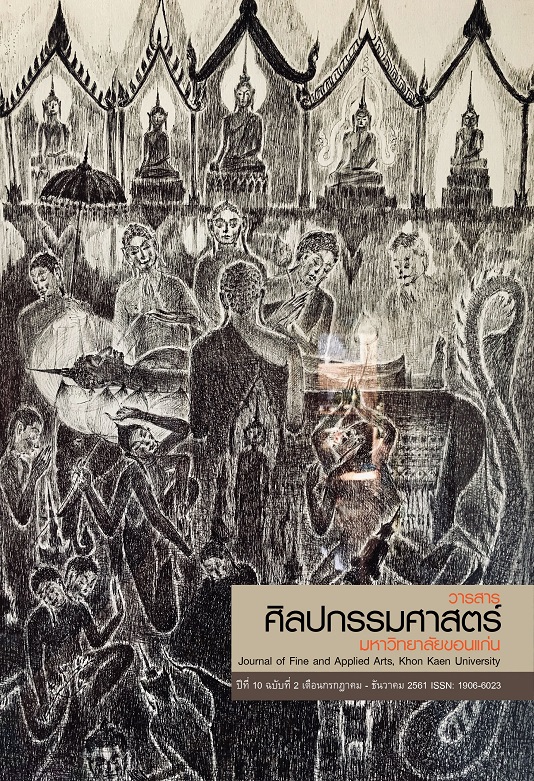A Melodic Analysis of the Film Songs by Henry Mancini
Main Article Content
Abstract
The purpose of this research is to study the life and works of Henry Mancini, as well as to analyze the characteristics of the melodies in his film songs. This study employed qualitative research methodology and was conducted by collecting data from websites, books and other documents and analyzing it according to western music theory.
Henry Mancini was born on April 16, 1924 in Cleveland, Ohio, United States. He began studying piano and became seriously interested in music at age 12. After serving his country in WWII, Mancini joined The Glenn Miller-Tex Beneke Orchestra as a pianist-arranger. In 1952 he joined the music department of Universal-International Studios. He became famous for writing the main theme for the TV series "Peter Gunn." Throughout Mancini's life, he scored over one hundred movies and TV shows. He won four Academy Awards, twenty Grammys, two Emmys, a Golden Globe and eight gold records. Henry Mancini died of pancreatic cancer in Los Angeles on June 14, 1994.
The major findings of this analysis of melodic characteristics of Mancini’s film songs are as follows: 1) After any leap in the melody larger than a perfect 4th, the melody usually continues in the opposite direction of the leap. 2) The substitute chords and respelled chords are usually used so as to allow the root of the chord to move, smoothly, by step to the root of the next chord. 3) Frequent use of accented nonchord tones. 4) The climax note(s) always appear in each period of the melody.
Article Details
Content and information in articles published in the Journal of Fine and Applied Arts of Khon Kaen University is regarded as the opinion and sole responsibility of the author(s) directly; therefore, editors are not obliged to agree to or share any responsibility with regard to the content and information that appears within these articles.
All articles, information, content, image, etc. that have been published in the Journal of Fine and Applied Arts of Khon Kaen University is the copyright of the Journal of Fine and Appllied Arts of Khon Kaen University. Any person or organization who wishes to distribute all or parts of the articles for further dissemination or other usage must first receive permission from the Journal of Fine and Applied Arts of Khon Kaen University before proceeding to do so.
References
Academy of Motion Picture Arts and Sciences (2017). 89TH ANNUAL ACADEMY AWARDS OF MERIT. Retrieved December 13, 2017, from https://www.oscars.org/sites/oscars/files/89aa_rules. pdf
Aldwell, E. & Schachter, C. (2003). Harmony & voice leading. 3rd ed. Belmont: Wadsworth Group.
Benjamin, T., Horvit, M., & Nelson, R. (1998). Techniques and materials of tonal music. 5th ed. California: Wadsworth Publishing.
Blume, F. (1989). Die Musik in Geschichte und Gegenwart. Allgemeine Enzyklopadie der Musik. Vol.9 (p. 23). Kassel: Barenreiter-Verlag.
Caps, J. (2012). Henry Mancini: Reinventing film music. Urbana: University of Illinois Press.
Forte, A. (1974). Tonal harmony in concept and practice. 2nd ed. New York: Holt, Rinehart and Winston.
Garrett, A.M. (1958). An introduction to research in music. Washington: The Catholic University of America Press.
Henry Mancini Enterprises, Inc. (2017). Awards. Retrieved December 13, 2017, from http://www.henrymancini.com/theman/awards
Kostka, S., Payne, D., & Almen, B. (2013). Tonal harmony: with an introduction to twentieth-century music. 7th ed. New York: McGrew-Hill.
Mancini, H. (1987). The new Henry Mancini songbook. Van Nuys: Alfred Publishing Co., Inc.
Mancini, H. & Lees, G. (2001). Did they mention the music?: the autobiography of Henry Mancini. New York: Cooper Square Press.
Rawlins, R. & Bahha, N.E. (2005). Jazzology: The encyclopedia of jazz theory for all musicians. Victoria: Hal Leonard Australia Pty.Ltd.
Roig-Francoli, M.A. (2003). Harmony in context. New York: McGrew-Hill.
Scheurer, T.E. (1996). “Henry Mancini: An appreciation and appraisal” Journal of Popular Film & Television. 24, 1 pp. 34-43.
Smith, J.P. (1995). The sounds of commerce: popular film music from 1960 to 1973. Doctoral Dissertation in Philosophy, University of Wisconsin-Madison, U.S.A.
Collins. (2017). Walking Bass. Retrieved December 13, 2017, from https://www.collinsdictionary.com/dictionary/english/walking-bass


